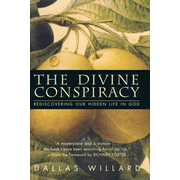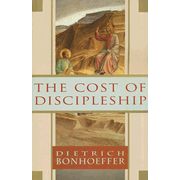 Living a righteous and holy life is not salvation it is the by product of salvation found in the finished work of Jesus Christ.
Living a righteous and holy life is not salvation it is the by product of salvation found in the finished work of Jesus Christ.
The gospel is often presented as "getting right" with God and the emphasis is on what we do rather than what Christ has done for us. Biblically speaking, a person "gets right" with God when they stop trying to be right with God by what they do and do not do and place their faith and hope in Jesus alone:
"But now God has shown us a way to be made right with him without keeping the requirements of the law, as was promised in the writings of Moses[a] and the prophets long ago. e are made right with God by placing our faith in Jesus Christ. And this is true for everyone who believes, no matter who we are. For everyone has sinned; we all fall short of God’s glorious standard. Yet God, with undeserved kindness, declares that we are righteous. He did this through Christ Jesus when he freed us from the penalty for our sins. For God presented Jesus as the sacrifice for sin. People are made right with God when they believe that Jesus sacrificed his life, shedding his blood. This sacrifice shows that God was being fair when he held back and did not punish those who sinned in times past, for he was looking ahead and including them in what he would do in this present time. God did this to demonstrate his righteousness, for he himself is fair and just, and he declares sinners to be right in his sight when they believe in Jesus. Romans 3:21-26 NLT
Righteousness according to the New Testament is first "Right standing" with God. This comes through faith in Jesus. Righteousness is also "Right living" or living a holy life. However, right living proceeds from right standing, never the other way around.
If you would like to go a little deeper with me read the following. It is a paper I wrote for my Masters Degree 10 years ago...
Salvation and holiness in the life of a believer
“I
press on toward the goal to win the prize for which God has called me
heavenward in Christ Jesus.” Philippians 3:14 (NIV)
What is the prize the Apostle Paul is speaking about?
Is he speaking of a reward that he is going to receive from his hard work and
effort? Is there something that he will accomplish that will merit God’s
special favor? If this is the case it would seem to contradict the language
used in Revelation 4:10, “…they cast their crowns before the throne…”
Clearly the only one worthy of glory and honor is Jesus Christ Himself
(Revelation 4:11)
What then is the prize Paul is talking about? What
reward awaits the redeemed and faithful believer? It is to be like Jesus
Christ! To reflect the image of Jesus Christ is the highest call to mankind.
“For those God foreknew he also predestined to be
conformed to the likeness of his Son, that he might be the firstborn among
many brothers. And those he predestined, he also called; those he called, he
also justified; those he justified, he also glorified.” Romans 8:29-30 (NIV)
Therefore, as Jerry Bridges has been quoted as
saying: “Holiness is not a series of do’s and don’ts, but rather a conformity
to the character of God.” Holiness is not the way to Christ; Christ is the way
to holiness (Rogers, 6, 1993) Holiness is Christ-likeness, and Christ-likeness
is God’s eternal purpose for His children (Stott, 233, 1995)
This passage in Romans is sometimes called “The order
of salvation.” It gives understanding to the process of salvation. There is a
past tense, present tense and future tense in understanding salvation. The late
Francis Schaeffer puts it this way:
Salvation is not
just justification and then blank until death; God never meant it to be so.
Salvation is a unity, a flowing stream, from justification through
sanctification to glorification…Romans 8:29-30 makes it plain, in the tenses
that are used, that salvation is to be seen as an unbroken stream (Schaeffer,
74, 1971)
Not only does this passage shed light about
salvation, but it also gives understanding to how holiness becomes the
by-product of salvation. Many times salvation is only seen as being saved from
God’s wrath, hell, sin etc. and rightly so, but there is something missing if
salvation is not seen as the restoration of humanity to reflect the image of
God. This is part of salvation scripture calls “transformation.”
The Greek word Morphe is a word the Apostle
Paul loved to use. Morphe means the inward and real formation of the
essential nature of a person (Ortberg, 23, 1997). In English the word is
translated formed in Galatians 4:19: “…until Chris is formed in you.” This is likened to the formation and
growth of an embryo in a mother’s body (Ibid). Another way this word is used is
found in Romans 12:2. The English is transformed, “Be transformed by the renewing of your
mind…” the Greek word is metamorphoo from which the English word metamorphosis
is derived. The idea is that of a caterpillar being transformed into a
butterfly. Romans 8:29: “…to be conformed to the likeness of His Son…”
This Greek word summorphizo is
translated conformed and it means to have the same form as another, to
shape a thing into a durable likeness (Ibid).
Salvation is both already and not yet. The
fulfillment of salvation, glorification, will not be realized until the end,
but because salvation has begun it’s work, there is a guarantee that it will be
fulfilled. When God initiates salvation divine infection sets in, not divine
perfection. The believer must live between the times, between the time the
infection set in and the time perfection will be realized (Fee, 136-137, 1996).
What does this have to do with holiness? It is
important to understand holiness from God’s perspective. Biblically, there is a
two-fold understanding of holiness. Holiness is positional in the sense that
because the believer is “in Christ” and because Christ is holy, His holiness is
credited to the believer. 1 Corinthians 1:30 states this truth: “It is because
of him that you are in Christ Jesus, who has become for us wisdom from God- -
that is, our righteousness, holiness and redemption” (NIV).
Equally true, holiness is practical in the sense that
the believer is called to exercise their will to imitate Christ (1 Corinthians
11:1), renew their minds (Romans 12:1-2), and walk in the Spirit (Galatians
5:16). J.I. Packer explains this truth when he says:
Holiness…is both a gift,
in God working in us to renew and transform us, and a task the task of
obedience, righteousness, and pleasing God. We must never so stress either side
that we lose sight of the other. Think only of the task and you will become a
legalist seeking to achieve righteousness in your own strength. If you think
only of the gift of God working in your life, the chances are Satan will trick
you into not making the necessary efforts and not maintaining the discipline of
righteousness…(Packer, 28-29, 1998)
Therefore, it is very important to stress and
understand that salvation and holiness both are the work of God redeeming,
renewing, and forming believers to reflect the image of His Son. That is the
goal and the prize of every believer that will result in God being glorified
and the believer’s joy.
Predestined for holiness
Romans 8:29 …predestined
to be conformed to the likeness of his Son…(NIV)
The word predestined
means to “mark out, appoint, or determine beforehand” (Zodhiates, 1667, 1996).
The Apostle Paul makes God’s purpose in predestination quite clear in Ephesians
1:4-5:
“For
he chose us in him before the creation of the world to be holy and blameless in
his sight. In love he predestined us to be adopted as his sons through Jesus
Christ, in accordance with his pleasure and will-“ (NIV)
God before the beginning of
time had a plan of choosing for Himself a people who would be holy “in Christ”.
Therefore, the result of this election is holiness for the believer.
If believers are to fully
grasp God’s election of them unto holiness, there needs to be an understanding
of why God created people in the first place.
Genesis 1:26-27:
“Then
God said, “Let us make man in our image, in our likeness… So God created
man in his own image, in the image of God he created him…”(NIV)
The Westminster Confession
explains: “After God had made all other creatures, he created man…with
reasonable and immortal souls, endued with knowledge, righteousness, and true
holiness, after his own image; having the law of God written in their hearts,
and power to fulfill it.” (Smith, 54, 1998).
Many people who feel they lack
purpose in life or wonder what they were created for could find joy in
understanding that they were created by God, the ultimate being, to reflect who
He is. People, because they are created in the image of God, are created with
the highest purpose and highest privilege of all creation. This rests in the
fact that there is no one greater than God. Therefore, the most loving thing
God could do is to create people that would find their ultimate joy in
reflecting God.
Reflecting the image of God
can be compared to the way a mirror reflects light and casts an image of what
is in the mirror. People were created to mirror God. How are people to reflect
God? By loving Him with everything, including Him in everything, being thankful
to Him, believing Him, and living for His fame, honor, and worth. People are
also to reflect God by how they love and treat one another (see Matthew
22:36-40).
The obvious problem is that
all have sinned and fallen short of reflecting God’s glory (Romans 3:23). To
refuse to reflect God’s glory is to deny the purpose for which people were
made. Adam and Eve experienced this in the Garden. As a result all of mankind
now lives in a shattered and distorted image of what they were created for
(Genesis 3, Romans 5:12).
Therefore, salvation,
spiritual development, and the pursuit of holiness are all part of the process
of restoring believers into the image of God. Colossians 3:10…put on the new
self, which is being renewed in knowledge in the image of its Creator.
(NIV)
The Prerequisite to holiness
Rom 8:30…those he predestined, he also called…(NIV)
Calling, Regeneration, and Conversion
Romans 3:10-18 states a
fearful charge against humanity. The charge states a guilty verdict of
rebellion towards God and the impossibility to walk in holiness in humanity’s
fallen state. If the believer in Jesus Christ desires to experience genuine
transformation to the extent that God intends, then they must understand what
scripture means by calling, regeneration, and why and how they were converted.
In a day and age when 80% of Americans say they are born-again, it would seem
crucial to understand biblically what salvation and holiness consist of.
Calling: The call of God does not
always bring about an affirmative response (Williams, 14, 1996). Many are
called few are chosen (Matthew 22:1-14). Scripture seems clear that there is a
general call to salvation for all men to repent and believe the gospel and
there is an effectual call that is required to awaken the person out of their
spiritual deadness. By effectual it is meant that God reveals effectively to
the heart of the believer their need to respond to the gospel (2 Corinthians
4:6) and summons people to himself in such a way that they respond in genuine
faith (Acts 16:14). In the effectual call the saved ones are the called ones,
which is not the case for everyone who hears the call. 1 Peter 2:9 “But you are
a chosen people, a royal priesthood, a holy nation, a people belonging to God,
that you may declare the praises of him who called you out of darkness
into his wonderful light” (NIV).
Regeneration: A prerequisite is something
that is required as a prior condition before something else can happen. Is it
possible to be holy without being born-again? Jesus stuns Nicodemus in John 3:3
with a prerequisite when He says: “I tell you the truth, no one can see the
kingdom of God unless he is born again.” Oswald Chambers notes:
If all
Jesus Christ can do is tell me that I must be holy, His teaching plants
despair. But if Jesus Christ is a Regenerator, One Who can put into me His own
heredity of holiness, then I begin to see what He is driving at when He says to
be holy. (Chambers, Oct. 6, 1935)
Therefore, regeneration is a
secret act of God in which he imparts new spiritual life and begins the process
of transformation (Grudem, 704, 1994). Regeneration transforms and renews our
fundamental nature.
It is important to note 1 John
3:9 “No one who is born of God will continue to sin, because God’s seed remains
in him; he cannot go on sinning, because he has been born of God. (NIV)
Regeneration has made us incapable of continuing in habitual sin. The believer
may fall into sin, but can not walk in it (Stott, 207, 1995)
Conversion: Conversion consists of
repentance or turning from sin and by faith, turning to Christ. Conversion is
not the cause of new birth, but rather the result of effectual calling and the
new birth (Grudem, 702-703, 1994).
Therefore, the effective call
of God, the miracle of regeneration, and genuine repentance of sin and faith in
Christ are prerequisites to salvation and holiness.
Purchased holiness
The
Substitution of Christ
If believers are to
understand what the cross means for them, they must first grapple with what the
cross means for God. John Stott poses the question: “How can God express His
holiness without consuming us, and His love without condoning our sin? How can
God satisfy His holy love? How can God, in His love, save us and satisfy His
holiness simultaneously? “Only by substituting Himself for the sinner (Stott,
132, 1986).
Before the believer
is to understand their purchased holiness, they must understand God’s holiness.
Jesus said that the cross was the main purpose in His coming to earth (John
12:27). Why? The answer is found in the character of God. God is holy and just,
because He is holy and just He must punish sin. The wrath of God, His righteous
response to sin, is as much one of His divine attributes as His love or mercy.
The reason most people do not understand God’s wrath is because they do not
understand sin. People tend to emphasize the love of God without emphasizing
the wrath of God of His holiness and justice. Yet, because each person is
created in the image of God, there is a cry for justice. Whenever an innocent child is abducted or
molested something rises up in them and people cry “let justice be done! Punish
the guilty! Give them what they deserve!” The same principle applies to God
towards sinners.
Thankfully Romans 3:21-26 declares:
But now a righteousness from God, apart from law, has
been made known, to which the Law and the Prophets testify. This righteousness
from God comes through faith in Jesus Christ to all who believe. There is no
difference, for all have sinned and fall short of the glory of God, and are
justified freely by His grace through the redemption that came by Christ Jesus.
God presented him as a sacrifice of atonement, through faith in his blood. He
did this to demonstrate his justice, because in his forbearance he had left the
sins committed beforehand unpunished—he did it to demonstrate his justice at
the present time, so as to be just and the one who justifies those who have
faith in Jesus.” (NIV)
The glory of the
gospel is that the One whom people need to be saved from is the same One Who
saves people (Sproul, 55, 1992). The sins of people are either resting on
themselves or resting on Christ (John 3:36)
Therefore, God was
not only motivated by His wrath towards sin, but also moved by the perfection
of His holy love. God in Christ substituted Himself for sinners. That is the
heart of the cross of Christ. If God in Christ did not die in the place of
sinners there would be no atonement, redemption, justification, or
reconciliation (Stott, 167-168, 1986). Since holiness is to mark the Christian,
holiness is to be understood as the ultimate purpose in Christ’s death upon the
cross. Colossians 1:22 “But now he has reconciled you by Christ’s physical body
through death to present
you holy in
his sight, without blemish and free from accusation…” (NIV)
Positional holiness
Justification
Romans
8:30 …those he predestined, he also called; those he called, he also justified, those he justified, he also glorified. (NIV)
Salvation needs to
be recognized in past tense (the believer was saved), present tense (they are being saved), and future tense (they will be saved). Another way of
saying this would be: believers were made holy, are being made holy, and will
be made holy. The past tense of salvation is called justification. The present tense
is called sanctification,
and the future tense is called glorification.
The real question
that all religions ask or are trying to achieve is “how does one become right
with God?” Righteousness or right standing before God is at the heart of the
gospel (Romans 1:16-17). When God is recognized for Who He is, the sinner can
only cry out, “Woe is me!” (Isaiah 6:1-5) For there comes the vivid realization
that all our righteousness is but filthy rags (Isaiah 64:6) (Williams, 61,
1996).
Justification
means: “to be declared righteous” on the basis of faith in the finished work of
Christ. The verdict includes a pardon from the penalty and guilt caused by sin
and credited merit on Christ’s account. Because Christ was the believer’s
substitute, no only was He in their place paying the penalty of sin at the
cross, He is also the end of them trying to achieve holiness by adherence to
the law (Romans 10:4). Another way of saying this is: because Christ lived a
perfect life without sin, God declares the believer to be in Him, and thus
perfect as well. The position of holiness comes from the perfection of Christ
not the believer. Justification is the believer being set free from the penalty
of sin.
If the believer is
to walk in holiness, they must be able to distinguish between justification
(declared holy) and sanctification (being made holy). No one has understood
Christianity that has not understood the word “justification” (Stott, 60,
1992). Without making a distinction between justification and sanctification
the believer will not experience anything other than probation and condemnation
awaiting certain judgment when they fail. This will only cause the believer to
become self-righteous and legalistic. Legalism is trying to achieve forgiveness
and favor from God through self-effort (Mahaney lectures). When this happens
the experience will not be true holiness, but rather an experience of
condemnation. When they focus on what they do rather than what Christ has done,
they are not walking in faith, therefore spiritual growth will be stunted and
misery is certain (Romans 7:5).
Pursuing holiness
In the book of
Romans the apostle Paul asks the question: “What shall we say, then? Shall we
go on sinning so that grace may increase? By no means!” (Romans 6:1-2 NIV) The
context of this particular verse is his previous explanation of justification.
He has just explained that God has declared the one who has faith in Christ to
be holy. The question was “if the believer was no longer under the law, but
under grace can they continue in sin?” Paul’s answer was an emphatic no! He
follows that response by explaining that the same grace that justifies the
believer is the same grace that makes them practically holy as well (See the
rest of Romans 6).
Romans 8:30
declares that the believer has been predestined, called, justified, and
glorified. These are spoken in the past tense. So what about the believer’s
pursuit of holiness? For the believer, the pursuit of holiness is called
“sanctification”. Sanctification is the progressive work of God and man that is
making us free from the power of sin and like Christ in our actual lives
(Grudem, 746, 1994)As Francis Schaffer has put it:
The Christian life is not an unbroken inclined plane. Sometimes it is
up, and sometimes it is down. While it is not possible to be more or less
justified, it is possible to be more or less sanctified. Justification deals
with the guilt of sin; sanctification deals with the power of sin in the
Christian’s life, and there are degrees in this…Salvation is a unity, a flowing
stream, from justification through sanctification to glorification…In certain
ways, sanctification is the most important consideration for the Christian now,
because it is the point where we are now (in our salvation experience).
(Schaffer, 74-75, 1971)
Much confusion
arises when sanctification is emphasized without first understanding
justification. Justification is a complete one-time transaction. Sanctification
(growing into Christ-likeness) is an ongoing process throughout the believer’s
life. Only when the believer dies or when Christ returns will they be made
perfect and this is called glorification. Sanctification stresses the
believer’s ongoing experience of freedom from the power of sin. One verse that
explains this difference best is found in the book of Hebrews: “…because by one
sacrifice he has made perfect forever those who are being made holy.” (Hebrews 10:14 NIV)
How does the
believer pursue holiness? First, the believer needs to identify with
Christ. The believer must know their union with Christ. They must know that
what happened to Christ happened to the believer in God’s sight: Romans 6:5-7
“If we have been united with him like this in his death, we will certainly also
be united with him in his resurrection. For we know that our old self was crucified with him so that the
body of sin might be done away with, that we should no longer be slaves to
sin—because anyone who has dies has been freed from sin.” (NIV)
The believer must
consider themselves dead to sin. “In the same way, count yourselves dead to sin
but alive to God in Christ Jesus.” (Romans 6:11 NIV) Just as the believer
accepted Christ by faith, he or she is to live by faith in God’s word that says
they have died to sin. The pursuit of holiness is not about feelings, but a
walk of faith in the promises of God. Because of these truths the believer is
now expected to “offer themselves as instrument of righteousness” (Romans
6:13). Therefore, the believer needs to know what happened to Christ happened
to them, consider themselves dead to sin by faith, and now offer themselves in
obedience to righteousness.
Secondly, in order
to pursue holiness, the believer needs to continually renew their mind.
Romans 12:1-2 states:
Therefore, I urge you, brothers, in
view of God’s mercy, to offer your bodies as living sacrifices, holy and
pleasing to God—this is your spiritual act of worship. Do not conform any
longer to the pattern of this world, but be transformed by the renewing of your mind. Then you will be able to test and approve what God’s
will is—his good, pleasing and perfect will”. (NIV)
This seems clear
that in order to walk in holiness the believer must under go change in their
thinking. The believer needs to learn to think like God rather than the world.
The major secret of holy living is in the mind (Stott, 232, 1995).
1 John 2:26
declares what worldly thinking is about: “Do not love the world or anything in
the world. If anyone loves the world, the love of the Father is not in him. For
everything in the world—the cravings of sinful man, the lust of his eyes and
the boasting of what he has and does—comes not from the Father but from the
world.” (NIV) The believer must allow God to declare their thoughts and renew
their thinking in the word on a regular basis.
Lastly, to pursue
holiness the believer must walk in the Spirit. Galatians 5:16 shares
this truth: “So I say, live by the Spirit, and you will not gratify the desires
of the sinful nature.” (NIV) To walk in the Spirit is to yield to the Holy
Spirit by faith. To yield to the Spirit means giving way to His prompting,
leading, and convictions. To walk in the Spirit is to be filled with the Spirit
(Ephesians 5:18), which literally means to be controlled by the Spirit. The
filling of the Spirit is no more or no less than complete surrender to Christ’s
lordship in daily living (Drummond, 28, 2001)
Promised holiness
Romans 8:30 “And those he predestined, he also called;
those he called, he also justified; those he justified, he also glorified. (NIV)
When Paul traces
the steps of the application of redemption, the last one he names is
glorification. Glorification will happen when Christ returns and raises from
the dead the bodies of believers for all time who have dies, and reunites them
with their souls, and changes the bodies of all believers who remain alive,
thereby giving all believers at the same time perfect resurrection bodies like
His own (Grudem, 828, 1994).
The wonderful thing
about Romans 8:30 is that Paul uses the past tense regarding a future event to
stress its certainty. 1 John 3:2-3 echoes this promise:
Dear friends, now we are children of God, and what we will be has not
yet been made known. But we know that when he appears, we shall be like him,
for we shall see him as he is. Everyone who has this hope in him purifies
himself, just as he is pure. (NIV)
Since justification
stresses the believer’s freedom from the penalty of sin and sanctification stresses the believer’s
experience as freedom from the power of sin, glorification then stresses the believer’s ultimate freedom
from the presence of sin.
Glorification is perfect conformity to the likeness of Christ, which is the
goal and gift of salvation and holiness:
Philippians 3:20-21
But our citizenship is in heaven. And we eagerly
await a Savior from there, the Lord Jesus Christ, who, by the power that
enables him to bring everything under his control, will transform our lowly
bodies so that they will be like his glorious body. (NIV)
There is coming a
day when believers will not even have the capability to sin. Therefore,
believers are to experience salvation and the gift of holiness as they press on
towards the upward call in Christ Jesus. The ultimate reward for believers is
the restoration into the image of God and the conformity into the image of
Jesus Christ.












